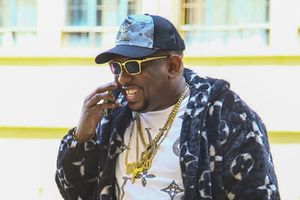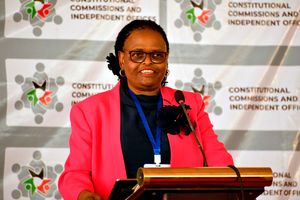How court helped Charles Koinange grab land in the 70s

It is only after British settler Douglas Leonard Bessant took his case to the Court of Appeal that this land grab was exposed. PHOTO | FILE | NATION MEDIA GROUP
What you need to know:
- In a clandestine move, the Registrar of Companies in July 1967 struck off Murita Coffee Estate Limited from the register of companies.
- Justice Simpson — and he allowed Njenga to have his way — seemed to agree that the government could declare a property bona vacantia and then dispose of it.
- The Court of Appeal ruled that the former Provincial Commissioner was incapable of writing a will before he died because he had Alzheimer’s disease.
If you want to know how land grabbing was legally done in the 1960s and 70s — and with the help of the Judiciary and government mandarins — follow this story of the late Charles Karuga Koinange, a former provincial commissioner in the Jomo Kenyatta government.
There is something called Karma in Hinduism: ‘Do good things and good things will follow your way.’
British settler Douglas Leonard Bessant had a coffee farm in Kiambu — which he had, of course, acquired in 1959 thanks to the colonial mischief in the former White Highlands.
Bessant had bought this farm at the wrong time; at the climax of the agitation for independence.
The arrival of Governor Sir Patrick Renison in 1959 and his intention to end the state of emergency had given colonial farmers a ray of hope especially due to his paternalistic attitude to African politicians.
This is the man who refused to release Mzee Kenyatta from jail, describing him as “a leader unto darkness and death”.
CHOICE FARMS
Before Besssant bought the farm, he incorporated a company in Nairobi on December 24, 1957, with a nominal capital of Sh100,000 divided into 5,000 shares of Sh20 each.
He owned 4,999 shares — meaning he was the sole owner of the company.
On July 24, 1959, Bessant purchased a coffee farm in Kiambu, LR No. 5999, and which was known as Murita Coffee Estate, after taking a loan from National and Grindlays Bank Ltd.
By then, on April 14, 1959, Jomo Kenyatta had just been released from Lokitaung and moved to Lodwar where he was joined by his wife Ngina and two daughters: Jane and Christina.
He would stay here until April 4, 1961 when he was flown to Maralal — pending release.
Every Sunday, Ngina would take the two daughters for mass at the local Catholic mission.
With the coming of independence, choice farms in Kiambu, and then White Highlands, became the target of the honchos in the Kenyatta government with Jomo leading from the front.
WELL-CONNECTED
It is not clear whether Bessant had deliberately mortgaged his farm on January 17, 1964 to protect it, or whether he wanted the money to turn around his venture, which had been hit by berry disease.
But what we now know from records is that he had taken Sh700,000 — a colossal amount in 1964.
There were three ways of getting choice land in the 1960s. Either you forced the settler owner to sell to you on a ‘willing-buyer-willing-selling’ principle, or the land was purchased by the government through the Land Bank and sold to known well-connected individuals under the Z Plot Scheme, where senior government officials were rewarded with 100-acre parcels and houses.
It was also the foundation of the settlement schemes in which the landless would be settled. The third is the gist of this story and has largely been unknown. Read on.
Koinange was well-connected in the Kenyatta government. His eldest brother, Mbiyu Koinange, was Jomo’s number one ally.
More significantly, he was Kenyatta’s brother in-law; a connection that came in handy as CK, as he was known, rose to become a District Commissioner and later a Provincial Commissioner.
In a clandestine move, the Registrar of Companies in July 1967 struck off Murita Coffee Estate Limited from the register of companies.
BESSANT BANKRUPT
It was one of the mischievous avenues used in the 1960s to dispossess adamant white settlers their land.
As such, the entire property was declared bona vacantia, which in law denotes a property with no legal owner.
The registrar did not care to find out whether Bessant was still repaying his loan; he had a balance of Sh400,000. The timing was perfect.
Murita farm had been hit by coffee berry disease and Bessant was struggling to pay his debts by the time the politicos came for his farm.
In September 1966, a petition to declare him bankrupt was lodged at the High Court and in six months he was declared as such.
It is not clear why the company, which was still in operation, was dissolved rather than be put under receivership.
What we know, however, is that the bank had appointed a manager for the farm who managed to repay the loan by 1976.
Ordinarily, the farm should have reverted to Bessant, whose bankruptcy had also been discharged on July 13, 1973. But it didn’t.
KOINANGE MAKES PURCHASE
The Commissioner of Lands, Jonathan Njenga, wrote to the manager on December 20, 1976, and asked him to hand over the farm to the government.
His argument was that after the dissolution of the company, the property was deemed to be bona vacantia and a day later, December 21, 1976, the farm was purchased by Koinange for Sh857,200.
By this time, Bessant was operating from an office on Muindi Mbingu Street, hoping that he would one day get his farm back.
He had also found a buyer who was willing to purchase the property at Sh1,500,000.
The reason Njenga moved fast to “sell” this coffee farm was that on December 17, 1976, Bessant had filed a petition to the Registrar of Companies in the High Court — and which was served on the Attorney-General, Charles Njonjo — for the company to be restored under section 339(6) of the Companies Act.
He had also sought a further order that the property of the company that had become vested in the government as per section 340 of the Companies Act should vest back to the company for all the estate and interest in it, then held by the government.
But by the time Justice Simpson heard the case, the land had already been taken by Koinange, by then a powerful Provincial Commissioner.
COURT RULING
Everyone could see through the Land Commissioner’s mischief and Frank Shields, who would later become one of the few liberal judges in the Moi era, and who was a state counsel, wondered in court why the purchasers had not been sued.
“It is impossible to do complete justice without their presence,” he told Justice Simpson.
Justice Simpson — and he allowed Njenga to have his way — seemed to agree that the government could declare a property bona vacantia and then dispose of it.
He even argued that the court had no jurisdiction under section 339(6) of the Company’s Act to set the sale aside.
His final argument was that even if he restored the company back to the register, it would only own the property of which the government had not disposed.
The judge thus refused Bessant’s prayer in the petition for the revesting of the farm to his company.
It is only after Bessant took his case to the Court of Appeal that this land grab was exposed.
But he had made a mistake in that he never asked for an order to revest the property back to his company.
TAX RETURNS
The three judges - C.B. Madan, E.J. Law and K.D. Porter - wondered why Justice Simpson refused to order the restoration of the company into the register.
They said: “The judge, having come to the conclusion that ‘I would be prepared to make an order restoring the company to the register’, he should have gone on to make the order instead of refusing it and saying as he did: … but since the only asset which would revest in the company on such restoration has been sold by the government such an order would be pointless.”
It had also emerged that the same farm had also been sold by the Commissioner of Lands to Mbwanju Limited for Sh840,000 — a throwaway price.
The Court of Appeal dismissed Mr Simpson’s argument that since the company had not filed annual returns between 1963 and 1967 — then it was not operational.
“The failure to file annual returns can be due to a variety of reasons, the commonest of them being oversight on the part of directors of the company. I appreciate that five years is a long time; but failure to file annual returns does not necessarily connote that the company is not carrying on business or is not in operation.
Even companies which are alive and healthy sometimes fail to file annual returns due to no other primary reason than merely oversight on their part to do so. … at any rate the company was still alive.”
FRESH GRANT
And since the bank had appointed a manager to run the farm, it also meant that the company was still alive by the time it was struck off the register.
Interestingly, the Registrar of Companies had not opposed the suit and the Court of Appeal was sympathetic to Bessant.
“If the name of the company were restored to the register, (it) would enable the company to repay the balance of the mortgage loan, and the principal shareholder (Bessant) to pay his creditors. This, I think, would foster healthy commercial conditions in addition to rehabilitating an institution and an individual.”
To cut the long story short, and as the appeal was pending the government issued a fresh grant and gave the land to Koinange.
The Court of Appeal was confused on what to do next: “In this unsatisfactory state of affairs I think that justice requires that the company should have the opportunity to take legal action should it be so advised.
I do not think that we should consider setting aside the sale to Koinange in these proceedings, to which he was not a party.
COURT BATTLE
Furthermore, I think that it would be imprudent for this court to consider making any such order in view of its limited knowledge of the material facts.”
Koinange went on to get this farm and it appears that Bessant lost any hope of getting justice.
When he died on February 20, 2004, Koinange left behind a controversial will that was invalidated by the courts for he had left a huge chunk of his wealth to Wilfred Karuga Koinange — the man who died fighting ghosts of the Goldenberg saga.
The Court of Appeal ruled that the former Provincial Commissioner was incapable of writing a will before he died because he had Alzheimer’s disease.
It also ruled that Dr Koinange’s bid to solely inherit the Sh5 billion empire, and disinherit everyone else, was unjust.
Before the property could be shared, Karuga also died…..and the battle for the Koinange property is far from over. Perhaps there is karma, after all.
[email protected] @johnkamau1




